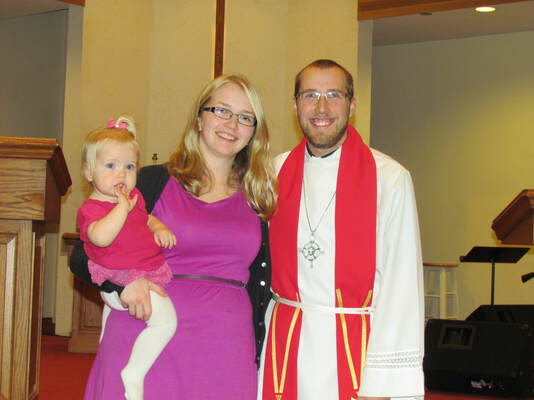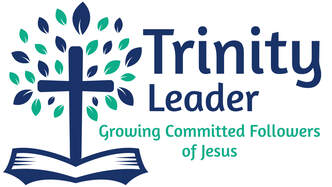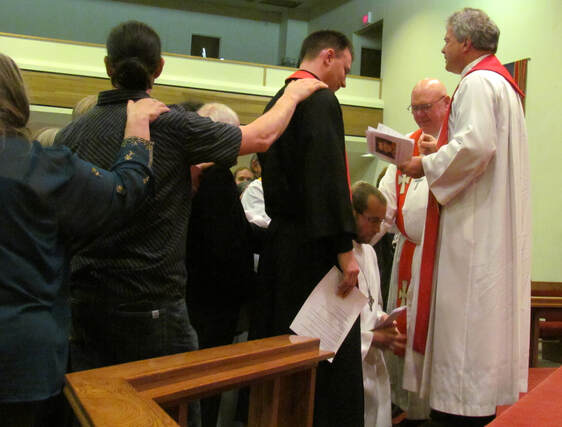 Today, the Protestant church (and Lutheran Church in particular) commemorates the Festival of the Reformation. On All Hallows’ Eve, 1517, Martin Luther posted his now famous 95 Theses on the door of the church in Wittenberg, Germany. This document created a tidal wave of change in the church as it called for major reforms to the practice and teaching of the Roman Catholic Church (to which almost all Christians except for those in the East belonged). I always feel conflicted on Reformation Day. On the one hand, the whole Church should celebrate the rediscovery of the true Gospel of salvation in Christ alone by grace alone through faith alone; the Gospel, which at the time was being muddled by the Church. Today is a day of remembering and celebrating the freedom we have in Christ which was magnified as the process of reformation continued. Individual believers read God’s Word in their own language for the first time and were empowered to be the priesthood of all believers. This is THE BEST NEWS for all of us and much good has come to the Church as a result of these events. But my heart also aches that there was and still is bitter division within Christ’s Church. There are some major issues that divide us but many other smaller ones that we needlessly have erected as barriers. Luther’s dream was not a Church that divided according to ethnic, theological, or geographic differences but a Church that was united in the true proclamation of the goodnews that is the salvation for the whole world. And yet, sadly my own tradition can veer toward treating today as a triumphal day of victory that mockingly proclaims, ‘we got it right and you got it wrong.’ This victorious spirit does little to foster deeper relationships between our brothers and sisters throughout the Church. Jesus himself has very strong words for those who become self-righteous and calloused to the work of His living Spirit. May we always be open to God’s moving among us. While part of me grieves each Reformation Day, a bigger part of me celebrates the continued work of the Spirit calling, gathering, enlightening, and sanctifying the whole Christian church on earth and keeping it with Jesus Christ in the one true faith. I rejoice at the ways the churches work together here in Leader for the Gospel’s sake. And I rejoice that the Spirit continues to call each of us to a continual process of reformation (sanctification) until that day when Jesus returns or calls us home. Consider today where the Spirit may be calling you to reconcile broken relationships, correct your wayward heart, or deepen your conviction about the truths you hold dear. Blessed Reformation Day!
0 Comments
 December 1 marks the 10th anniversary of my ordination and January 1 is ten years at Trinity. Over the next month I hope to share some reflections on ten years of ministry: what we’ve learned, what we’ve celebrated, and where we can keep growing (I use plural because ministry is more than just an individual work, it can’t be done without the support of so many others). These posts won’t be exhaustive, just an honest reflection of where my brain is at as a decade comes and goes. Abiding Presence Each year I try to read Dietrich Bonhoeffer’s book Life Together because it outlines a beautiful ethic for the Christian life and ministry. In the Introduction to the edition I have, it is written about Bonhoeffer, “For him Christianity could never be merely intellectual theory, doctrine divorced from life, or mystical emotion, but always it must be responsible, obedient action, the discipleship of Christ in every situation or concrete everyday life, personal and public.” There's no dividing line between faith, life, and ministry; it's all Gospel presence. When we moved to Leader Cassy and I hoped for rooted longevity both for our young family (Abby was just 1) and for our ministry. Building connections and relationships takes time but is foundational to life together, which is why we always hoped we’d be here long term. Simply being around and intentionally joining community life has helped build mutual trust, understanding, and spiritual growth-- we’re not in the honeymoon phase or just waiting for a new pastor to do differently; we’ve seen each other at our best and worst and come through together. It is a beautiful, sometimes difficult, thing!
I’ve always attempted a simple ministry of presence (for myself and everyone), that in conversations and togetherness people would see Jesus in all we do. One of my favorite things about Leader is that this can be embodied everywhere, there’s no hiding away or escaping from each other; we live, shop, eat, and play in the same places. Some of the best spiritual discussions have happened at the ball diamonds and the post office. Pointing to Jesus in everything has always been at the forefront of what I want to be about. My prayer before I visit someone is always, “May they see Jesus through me.” One of the best ways of doing that is just by being--being in the presence of others or being the presence of Christ. It's something I struggle with as a person who likes to get things done but I look to Jesus for encouragement. Jesus so often demonstrates an abiding presence in His ministry; not rushing about or checking off to-do lists but being fully present to the person who needs Him each moment. He in fact invites us to abide in Him and He in us (John 15:4). I’ve tried to live this out by being present to those around me-- in my study, downtown, on Messenger, in homes. I count it as a true privilege to be welcomed into your lives as your pastor, celebrating the good and grieving in the bad. Thanks be to God for His grace as I faithfully try to live this but fail constantly (and thank you for your grace toward me as well). As we continue to abide with each other and together in our Jesus, I thank God for our abiding presence together at Trinity and pray that it continues to grow in the years to come! 4 minute read...  I’ve been prayerfully reflecting this morning on the election results last night; one that was dubbed, ‘the election no one wanted and no one got what they wanted.’ Some are satisfied with the result while perhaps a greater number (especially here in the West) are unhappy with what unfolded. 1 Timothy 2 has been on my mind, “I urge, then, first of all, that requests, prayers, intercession and thanksgiving be made for everyone-- for kings and all those in authority, that we may live peaceful and quiet lives in all godliness and holiness.” (2:1-2) When it feels like your voice isn’t heard and you didn’t get what you wanted it can be tempting to be bitter and angry. Paul encourages Timothy to pray for government authorities which is particularly striking given the Emperor at the time was Nero, someone infamous for persecuting Christians. Certainly, the political structure was different at the time, with the nation as a whole not having a democratic voice. But he didn’t say, be angry, bitter, and hold the leader with contempt in your heart. He simply said pray because he recognizes that the Christian has a responsibility and hope that goes beyond worldly authority. Timothy is told to pray so that we may live peaceful and quiet lives in all godliness and holiness. To our Canadian ear that sounds like a prayer that we can do as we please for ourselves. But it is a prayer for our deeper Christian calling, that we could live our lives (vocations) unhindered, as conduits of God’s love to our neighbours. This is seen as we read the next verses, “This is good, and it is pleasing in the sight of God our Savior, who desires all people to be saved and to come to the knowledge of the truth.” God’s deepest desire for all people is to come to know Him. God invites us in very tangible ways through our lives, work, and relationships to help others know His love for them. Praying for our leaders is a reminder of our greater calling as Christians, to be in service to our society. I wholeheartedly encourage you to keep exercising your rights as Canadians: to seek change and make your voice heard; vote, advocate, speak up--we are so privileged to have these rights to exercise. We may be [deeply] disappointed with the results last night, it's important to voice that, but may we not get so lost in frustration that we forget our highest calling as Christians of loving God and each other.  This was published as the Inspiration Corner in the Leader News on Tuesday Sept. 24. At the beginning of his iconic show, Fred Rogers would invite millions of viewers to be his neighbour, to share life together. Living in small town, that’s what we’re invited to do with each other and that’s how Jesus has told us to live. After loving God, the most important thing we can do is to “Love your neighbour as yourself” (Matthew 22:39). Those are challenging words to live by, especially when you have to deal with people you’d rather avoid (Jesus identifies your neighbour as anyone you come in contact with.). It would be far easier to write off the difficult person or have nothing to do with them but that discredits them as a person made and loved by God. So, how do we take the difficult steps to love our neighbours (which is such an important practice in small town because we have to live and work with each other!)? Here’s a few of my thoughts: Think Less of Yourself/More Highly of Others: In a world of carefully cultivated Instagram photos we can have a distorted sense of reality and ourselves. This goes against all modern ideals of rights and freedoms but consider laying down some of your rights for the betterment of your neighbours. Isn’t it better if we all have an opportunity to thrive instead of just a few of us? When you stop looking down on people, suddenly those around you aren’t less than you but are equal to you; they may look, live, and act different from you but we all have been made and loved by God. Be Generous in Forgiving: This is a very hard thing to do especially when you’ve been deeply hurt or wronged. But Christians in particular (and all people) have the example of Jesus who freely offers forgiveness even when we don’t deserve it. One piece of advice that I was given a long time ago is that you don’t know what another person has gone or is going through. It is helpful to be more forgiving when you realize how hurt and broken another person might be. Forgiving though, doesn’t mean you let someone walk all over you. Instead of wanting to get even let some of the petty things pass. Communicate: We are more connected than ever through smart phones and gadgets but we have forgotten how to talk with each other. We send gifs and emojis but can’t carry on a conversation. Perhaps it’s time we learn to talk with each other again; to share what’s frustrating, hurtful, good, or helpful about another person’s actions toward you. For us conflict averse people, it is hard to talk about what’s bothering us but it is important for a healthy relationship. There are many more ways that we can work together to love each other and seek the good in each other. We need to support each other for the benefit of this community. What are you doing to be a better neighbour, co-worker, and friend? I’d love to hear from you!  They say the definition of insanity is trying the same thing over again expecting different results. I know some of us feel this way about spending time in God's Word. There might be a desire to make a habit of Bible reading and prayer but just don't get around to it or you do it for a while (maybe because you feel like you should) but it just doesn't stick. It can seem like you're trying the same things over again and not seeing any different results. Perhaps it's time to try something different. This year at Trinity we are wanting to focus on growing as committed followers of Jesus based on the model of Jesus’ original disciples. In the Gospels, we are told that the disciples were with Jesus— they heard him teaching, they saw him heal, they ate with him. The more time the disciples spent with Jesus the more they got to know him, which changed their lives and ministry. The best way for us to spend time with Jesus is by being in his Word which we believe shows us the person of Jesus and helps to shape us into the people Jesus calls us to be. Many of you have a consistent Bible reading and prayer time that works for you… that is fantastic! Keep it up! Others of us struggle to maintain consistency in the Word or just don’t take the time at all. Here are two things that I have tried recently in my devotional life just as a way of changing things up a bit to keep God’s Word fresh in my life.
Try something different today! We just finished the long season of Lent, forty days of contemplation, reflection, and confession, by remembering Jesus’ death and forgiveness on the cross. I think this is a season that we as a church do well (not perfectly). It seems easy for us to grasp the sombre nature of the season, to be intentional about practicing Lenten disciples which draw us deeper in relationship to our loving God.
What we don’t do so well is the season that follows Lent: Easter. Sure, we ‘get’ the day of Easter, the joy of that festive day with all its flowers and music and excitement. But Easter is actually a fifty day celebration in the church; we don’t just celebrate Easter on one day but for the next seven weeks! The weeks following Easter are a celebration of the Lord and Saviour of the world’s defeat of death. These fifty days correspond with the fifty days that the resurrected Jesus walked with his disciples revealing his glorified resurrected body while preparing them for the work ahead of carrying on the ministry of the Kingdom of God in the power of the Holy Spirit. As we now find ourselves in the midst of these fifty days of Easter, the words of Jesus echo in the background of our time of celebration. Multiple times during his last meal with his disciples before his crucifixion, Jesus expresses his desire that their joy may be complete (John 15:11; 16:20, 22, 24; 17:13). After his resurrection, Jesus’ disciples “were overjoyed when they saw the Lord” (John 20:20). The Easter season (and our whole lives as Christians) is meant to be a season of rejoicing; Easter is a season of joy! But rejoicing doesn’t always come easy. How often do we grumble and complain instead of rejoicing in it? How often do we speak negative about someone or something instead finding positive things to say? I think we need to make a habit of practicing joy in all areas of our lives. However, as almost anyone can tell you, we all want joy but we don't all have joy. That’s because joy is not something that we can pursue, it's not something that we can just fix our minds to. Sure, that works for a time—you can think positively trying to find the good in all circumstances (which in fact Paul encourages us to do in Philippians 4:4, “Rejoice in the Lord always; again I will say, rejoice”) —but inevitably you will come up short, because joy in this case is tied to what you are doing instead of in who you are. Why did the disciples have joy? Because they saw and believed in the Lord. It had nothing to do with them remaining positive; it had everything to do with their relationship with Jesus. Joy —real, lasting joy—is something we experience as we walk with the Lord each day. Eugene Peterson says, “Joy is not a requirement of Christian discipleship, it is a consequence. It is not what we have to acquire in order to experience life in Christ; it is what comes to us when we are walking in the way of faith and obedience.” Do you want real, lasting joy—the joy that Jesus promised his disciples? It comes from being with Him in the Word, and prayer, and knowing Jesus is present with you through the Holy Spirit who leads us into all truth and life. This Easter season may we be people of joy; people who rejoice in knowing our Saviour lives and that because he lives we have the fullness of life now and forever. Live in that full life Jesus has offered to you.  There are things that you do everyday brush your hair (if you have any!), make your bed, go off to work, and the list goes on. Most of these things you do without much thought, they’ve simply become an ingrained habit that you don’t pay attention to until your routine is disrupted by vacation, retirement, the end of the school year, or sickness. We live such busy lives that it is easy to sleepwalk through them doing the same thing day in and day out. Where does God fit into your routine? Where is God in the daily rhythm of your life? Time and again in Scripture, we hear the desire of God to be a part of our lives. In creation, God didn’t make people like everything else He created, we are uniquely made and designed for relationship. Even after Adam and Eve (and each of us) chose to make a way apart from God, He came looking for us. God wants to be a part of your life! Where is God in the daily rhythm of your life? Below are a few approaches (one stands out as better than the rest) we sometimes try to make God part of our lives. Adding Jesus: In our attempts to make God part of our lives we often try to ‘add Him into the mix.’ We go on living normally but tack on a couple of minutes to pray or read a devotion and Scripture. These are good things, we should be in the Word and prayer! But it is approached as a duty—just another thing to check off our list for the day—we add in God when it is convenient for us. But God wants to be more than just an ‘ingredient’ we add to flavour our lives. Jesus used the image of yeast in Matthew 13:33 as the picture of how He gets mixed into the whole of our lives—He leaves nothing untouched! Including Jesus: In this approach we acknowledge Jesus as important for our daily lives but we stop short of allowing Jesus to fully be Lord of our lives. We spend time with Him in Word and prayer and seek out His leading but we ultimately have the final say; we hold onto ‘veto power’ over anything that God might want to do with us. Jesus is allowed to be part of our life but we don’t completely surrender all to Him. Attending Jesus: Whereas the first two approaches to being more mindful of Jesus in our lives focused on what we allowed, this approach is more passive. When we attend Jesus we watch what He is doing all around us; we understand our whole day to be worship and honouring to God. With this mindset, it is not about what we are doing but what Jesus is doing in and through us. The more we’re attentive to Jesus, the more our lives will look like Him: time in prayer and the Word become vital to us as we meet Jesus in those moments, our interactions with people become meaningful because we see Jesus at work in all we say and do. It is like the yeast that doesn’t just add a little flavour but completely changes the substance of the mixture; the effects of the yeast are abundantly obvious in the final product. As we grow in our walk with the Lord, through the power of the Holy Spirit, we should naturally be growing toward the third approach of attending to the work God is already doing in our lives. But don’t fret if you’re not yet there (I’m not either!) This is a growth opportunity as we continue to grow in the grace and love of Jesus that he lavished upon us. Watch for Jesus! He is at work in you right now. Be attentive to the work of the Holy Spirit forgiving, loving, and calling. Go boldly with Jesus ingrained in the rhythm of your life!  It’s another day and there’s another celebrity accused of sexual misconduct. With each new revelation there is the typical cycle of responses:
In celebrities, we find an escape from our mundane lives filled with disappointed and struggle; we connect ourselves to the character the celebrity plays. We may be attracted to the good guy who always comes to the rescue; the underdog who looks like they should fail but miraculously succeeds; the deeply flawed character who struggles but gets through life; the sports hero who comes through in the clutch. We are attracted to celebrities and the roles they play because there is a part of us that wants to identify with them. We identify with celebrities because they offer us hope—an escape from what our lives actually are to that which we long for. There is so much shock each time a different celebrity’s deplorable actions are revealed because our hope in the celebrity’s persona is shattered; the escape and dream we found in them is exposed as not real. We have treated celebrities as if they were gods, able to rescue us (at least momentarily). We’ve welcomed them into our lives, we’ve believed what they said, and in them we’ve found hope for something better than we have. Like all people they too will fall short, disappoint, and ultimately seek their own power and glory. Why are we still surprised by the endless stream of allegations? It is because we are looking for hope; we want hope in a world and a life that can feel downright hopeless some days. In God we find hope and the promise that the wrongs of this world will be made right. We are right to be saddened each time we hear of abuse whether celebrity or otherwise because it is a symptom of our world broken by sin. We ought to be saddened but we should not be surprised. Scripture tells a horrifyingly predictable pattern of God’s people failing to get it right, failing to love God and each other perfectly; it is a story of people seeking their own glory and honour. But more significantly Scripture is a story of redemption and hope where we learn of a God who will never disappoint because His words and actions are always unchanging. We learn of a God who offers us hope and escape from a life of disappointment, pain, and frustration. We learn of a God who cares so much for you that He invested Himself in this world in the simplest way, as a baby, to bring life and relationship with Him now and forever. Because we believe in a God of redemption we should pray for the victims to receive the healing power of God’s presence in their lives and for the accused to come to repentance and restoration in Jesus. We should also examine ourselves: we are all sinners in need of God’s grace and we all turn away from God to chase after those things that seem to offer us hope in the present. The next time you hear allegations of celebrity misconduct,, ask yourself ‘why am I still surprised?’ Is it because of the brokenness of the situation where lives were damaged and people hurt? Or is it because in our search for hope we thought we found it in this larger than life person, only to be disappointed once again? Keep looking to God, the only One who won't disappoint you!  Why does prayer seem so hard? I’ve been pondering that question recently as prayer has been the topic of many of my readings recently. Jesus repeatedly calls his disciples (us) to prayer. Prayer has been a central component of a faithful walk with God throughout the life of the church because it connects us to our personal and loving God. Beginning with the Israelites and continuing through Judaism today, God’s people have taken designated times for prayer throughout the day. But if it is so important, why is it so hard to pray? Here are three of my thoughts: We don’t see the effects. Many of us have been conditioned to think of prayer as some sort of magic words which when done correctly will conjure up anything we dream. The problem is that prayer doesn’t work that way! Sure, Jesus invites us in Matthew 7 to ask and it will be given us. Think about when you pray most often; is it when you need something or are looking for direction in life? Our prayers are often focused around our needs exclusively which leads to frustration when we don’t get what we think we need through prayer. Often we aren’t paying attention to the way God is responding to our prayers because he is doing so in a way that’s different than we expect. Pay attention for the unexpected ways God is at work in your life. We are too busy. There are times that prayer seems like a luxury sort of like taking some time off from our busy lives. Martin Luther purportedly said of prayer that he has “so much to do today that I’m going to need to spend three hours in prayer in order to be able to get it all done.” Jesus too emphasized the importance of prayer in Matthew 9 when he told his disciples that the harvest is plentiful (there is a lot of work to do). Before he sent them out to proclaim the good news of the Kingdom, he called them to pray, “The harvest is plentiful, but the laborers are few; therefore pray earnestly to the Lord of the harvest to send out laborers into his harvest” (Matt 9:37-38). Prayer is not just a luxury we can afford when there is extra time; prayer is a necessity to get through every day. We don’t know how to pray. Even though prayer has been central to the Christian life for thousands of years, too many of us (think we) don’t know how to pray. Sometimes we have the impression that our words need to be just right and that we need to sound like we know what we’re doing. Jesus condemns that type of thinking about prayer and instead simply models how to pray. He gave as a model these words: Our Father in heaven hallowed be your name. Your kingdom come, your will be done, on earth as it is in heaven. Give us this day our daily bread, and forgive us our debts, as we also have forgiven our debtors. And lead us not into temptation, but deliver us from evil. There is nothing fancy here. Just an invitation by Jesus to enter conversation with our God who created and keeps us by fixing our attention not just on our lives but on His work in the world around us. Prayer at its simplest is sharing with God hopes, dreams, concerns and worries of our lives and what we long to see him do in them. You may not think you are good at praying or have the time but if you desire a closer relationship with Jesus, prayer is the way to start. Spend a few minutes now in prayer using Jesus’ words as a model: pray for the continued growth of God’s kingdom here, pray for the needs you and others face, pray for strength to live your life to its fullness for the honour and glory of God.  This Sunday, the church celebrates Holy Trinity Sunday, a day when we focus on the three persons of our one God. But what is the Trinity (other than being the namesake for our congregation)? You may be quick to answer something to the effect of the three-in-one; Father, Son, and Holy Spirit; three persons in one being. One of the common images used to help us understand the concept of the Trinity is that of an egg which has three parts (shell, yoke, and white) but is still just 'one' egg. Other images often used to help clarify this abstract concept are the three properties of water (ice, water, vapour) or a three-leaf clover. These are helpful in a limited way but they fail to communicate fully the intimacy within the Godhead(and why the concept of the Trinity matters). Our minds find it easy to differentiate the three roles of God as revealed in Scripture: the Father as Creator and Sustainer, the Son as Redeemer (Saviour), and the Holy Spirit as Sanctifier (one who is working holiness in us and calling us back to Jesus). More difficult is to put those three distinct roles together so that they are not three completely separate beings but three parts of one. Whenever one part of the Trinity talks about another, there is always a closeness assumed; read John 14:15-30 to see what I mean. It is this closeness that makes the Trinity an important part of our everyday life with God because we are not distant from God but have the Holy Spirit in us. That means God in His fullness is dwelling with us, knows us, and cares for us every step of our journey; we have the Holy Spirit who leads us into the truth, forgiveness, and life of Christ who in turn has made it possible to share life forever (as originally intended) with our loving and creative Father. Our whole life holds together in the relationship of God the Father, Son, and Holy Spirit. This was so important to the early church that they spent years defending the concept of the Trinity as a unity of three persons. The Athanasian Creed was developed to safeguard the truths about God which were increasingly coming under attack. Once a year, on Trinity Sunday, we read the Athanasian Creed (which admittedly is long and repetitive) as a means of reorienting ourselves amid a disorienting and fragmenting world that would lead us astray from God as revealed in the Scriptures. Here is the text of the creed (click the link). It has strong language about the necessity to confess these teachings which reminds us in a shocking way of what is at stake. I challenge you (and it will be a challenge) to read through the creed trying to understand what’s being communicated and use it to sift your understanding of God. May you be blessed as you are reminded of God the Father, Son, and Holy Spirit’s continued work and presence in your life! |
AuthorPastor J-M shares some occasional thoughts and musings on our life together as followers of Christ. The views are his own. Archives
October 2023
Categories
All
|
- Home
- About
-
Learning & Growing
-
Sermons
>
- 1 Samuel
- Lent
- Spiritual Conversation
- Advent
- 1 Timothy
- Single Messages
-
Older Sermons
>
- Judges
- Joshua
- Galatians
- Lamentations
- 1 Peter: Living Hope
- Acts
- What Does This Mean?
- Gospel Identity: Gospel Living
- Nehemiah
- Questions of Faith
- Proverbs
- Hebrews
- Sermon on the Mount
- 1 Thessalonians
- Psalm 23: Walking with the Lord
- I Believe: The Apostles' Creed and a Living Faith
- 1 Corinthians
- Difficult Questions
- Genesis: God's Endless Faithfulness
- The Lord's Prayer
- Mark
- Genesis
- Bible Studies >
- Kids
- Blog
-
Sermons
>
- Worship Videos & Resources
- Contact
- Home
- About
-
Learning & Growing
-
Sermons
>
- 1 Samuel
- Lent
- Spiritual Conversation
- Advent
- 1 Timothy
- Single Messages
-
Older Sermons
>
- Judges
- Joshua
- Galatians
- Lamentations
- 1 Peter: Living Hope
- Acts
- What Does This Mean?
- Gospel Identity: Gospel Living
- Nehemiah
- Questions of Faith
- Proverbs
- Hebrews
- Sermon on the Mount
- 1 Thessalonians
- Psalm 23: Walking with the Lord
- I Believe: The Apostles' Creed and a Living Faith
- 1 Corinthians
- Difficult Questions
- Genesis: God's Endless Faithfulness
- The Lord's Prayer
- Mark
- Genesis
- Bible Studies >
- Kids
- Blog
-
Sermons
>
- Worship Videos & Resources
- Contact



 RSS Feed
RSS Feed